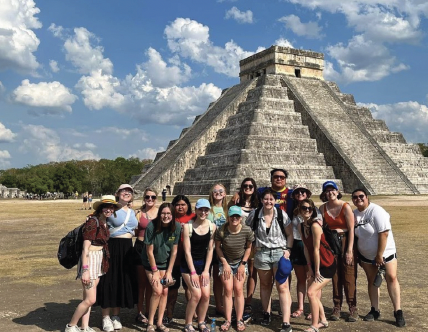UNI’s study abroad program bounces back post pandemic

A group of students went to a faculty-led trip to Mexico this past summer. This year, all of the faculty-led programs are tied to UNIFI credit instead of Capstone credit, meaning that students are no longer required to be of junior standing to participate in the two to three week long programs.
Oct 19, 2022
More students are looking to study abroad through UNI as it has been bouncing back since the pandemic restricted travel over the last couple years.
Ann Frenna, who works as a secretary at the study abroad center (SAC), says it was a challenge to function during the pandemic because of health risks and travel restrictions but is happy to see study abroad programs start up again.
“At this point, all of our partner universities have welcomed students back to their campuses. The loosening of travel restrictions and entry requirements has made travel much easier,” Frenna said.
According to Frenna, the planning that goes into students studying abroad hasn’t changed much since the program has been reopened. Students typically discuss the location they’d like to go to, how long they plan to stay and what courses they’ll take.
“The only difference is that we do have some students coming in to plan their experience abroad later in their academic career than they had initially planned because COVID-19 prevented them from traveling for a time,” Frenna said.
Another adjustment the program encountered was the change from LAC core classes to UNIFI.
“As UNI makes the transition from the LAC structure to UNIFI, we continue to work with upperclassmen who are continuing to earn LAC credits at universities abroad and through short-term faculty-led programs over winter session and in the summer months,” Frenna said. “Those students who are on the UNFI track are able to satisfy those courses abroad as well.”
According to Frenna, study abroad students also go through a process of having their courses abroad pre-approved so that they know how their credits will come back to UNI at the end of their experience. The biggest change from the LAC core to UNIFI is the change in Capstone requirements.
“One change is that in the past, students had to be of (at least) junior standing to satisfy their Capstone through a short-term faculty-led program,” Frenna said. “Now that many of these two to three week long faculty-led programs are tied to UNIFI credit, all students can participate in this type of study abroad experience.”
The locations available for students to study abroad change yearly. Currently, there are programs open to study at universities in 14 different countries. Students can also participate in a two to three week long faculty-led program over winter session or in the summer.
“We have exciting faculty-led summer offerings in Greece, the Galapagos Islands, the United Kingdom, Brazil, France, Mexico and Spain,” Frenna said.
Frenna believes that having the opportunity to study abroad helps students grow academically and emotionally while preparing them for their professional future in a global community.
“Studying abroad is a unique, life-changing experience,” Frenna said. “The UNI Study Abroad Center provides a wide-range of opportunities for students to study across the globe.”
According to Frenna, most programs offer courses in English, while select programs focus on foreign language proficiency.
The Study Abroad Center strives to match each student with a program that’s compatible with their academics, budget and desired location.
“We have been very busy meeting with students who are excited to plan their experience abroad while at UNI, this year.”













